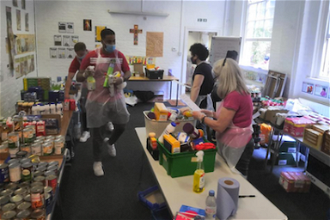Viewpoint: Report charts growth of foodbanks - but are they a welcome development?

Paul Donovan
Christmas is a time of good cheer and consumer excess for many but in this rich country it is also a time when the growing levels of poverty become most visible. Nowhere is that more so this year than with the growing numbers of people going to foodbanks.
The Trussell Trust, which runs the nationwide network of foodbanks, reports 913,000 going to foodbanks over the past year – an increase of 129,000.
The Trust point out that there have been 500,000 people coming to foodbanks in the six month period between April and September this year, 38% more than for the comparable period last year. Currently, 45% of food bank referrals are due to benefit delays and changes, including sanctions and 22% of the 500,000 that came cite low income as the main trigger for the crisis.
So foodbanks are flourishing. The question though must be what should be the approach moving forward?
An excellent report funded by the Church of England and compiled by the All Party Parliamentary Group on Hunger has credited the foodbanks for staging 'a social Dunkirk.' The report, Feeding Britain, makes three main recommendations, first that there are changes to the benefits system to ensure people are not thrown into poverty.
The inquiry’s evidence suggests some households “may have been left vulnerable” by the bedroom tax, changes to disability benefits and the abolition of council tax support. But it has been the way benefits have been administered, including the heavy handed sanctions scheme that bear most responsibility for driving people to foodbanks.
The report suggests the payment of benefit entitlements in five days: the current average clearance time is 16 days. Also, in the case of sanctions that a “yellow card” system should be introduced giving claimants a second chance before payments stop. The report also identifies low pay as a key driver in pushing people toward foodbanks. It suggests that the living wage should be implemented across the country, thereby putting more money into people’s pockets.
The third suggestion is the creation of a new generation of “super” food banks, which combine food aid with welfare advice and advocacy. This network of foodbanks would bring together the existing players with supermarkets and the state.
Supermarkets are singled out for the amount of food wastage that goes on. The report suggests the supermarkets could redeploy some of this food and play a much more hands on role in helping out with the foodbanks.
It is this third recommendation that in many ways is the most crucial and goes to the heart of the dilemma with foodbanks. It is a step toward institutionalising foodbanks, rather than seeing them as a temporary measure to deal with a hunger crisis.
The story of foodbanks in Canada provides a salutary lesson. Foodbanks were introduced in Canada in the early 1980s in what was perceived as a tough economic time. There are now 700 foodbanks in Canada, providing help to 800,000 people. The number has increased by nearly 100,000 over the past six years – as the country has come out of economic recession. There have been an abundance of low income jobs created as part of the economic recovery – sound familiar?
Writing in the Guardian, Graham Riches, emeritus professor and former director of the School of Social Work, University of British Columbia, tells how foodbanks have become a second tier of the benefits system in Canada. “The sad fact is that in Canada, with its 30-year track record of increasingly corporatised food charity, recent national data shows that one in eight households or 3.9 million individuals (11.6% of the population) are still experiencing food insecurity,” said Riches, who criticises the Feeding Britain report for only addressing the supply side of the question and thereby recommending “a vanguard role for the charitable food industry and food waste in the battle against structurally caused food poverty.”
He argues: “this can only lead to the long-term institutionalisation of food banking and diminish political appetite for progressive reform."
Riches warns that in Canada, the food charity industry has fostered the de-politicisation of hunger and its social construction as a matter primarily for community and corporate charity, and not a human rights question demanding the urgent attention of the state. “Today, Canadian public perception of food charity is that it should take care of domestic hunger. Governments can look the other way,” said Riches, who suggests that a right to food should be entrenched in domestic law backed by international statute, then the obligation to deal with hunger would be put fully back under the responsibilities of the state.
The dangers with some of the recommendations of the Feeding Britain report are that, if followed, they could lay the way to further demolition of the welfare state in the belief that foodbanks and other charitable institutions will pick up the slack. The recommendations about addressing low pay via the living wage are welcome but there needs to be a far more fundamental effort to address the causes as to why one million people need to go to foodbanks in one of the richest countries in the world. For the Church, the issue has to be one of justice, or put very simply, the right of many people to live.
Read more about the Trussell Trust here: www.trusselltrust.org/





















